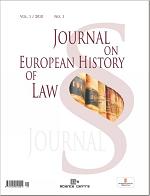Sui contratti commutativi misti a donazione: possibili origini romane dei moderni criteri qualificatori
On the Transactions Characterized by Mutuality and Donation: Do the Modern Criteria of Legal Qualification Have Roman Origins?
Author(s): Roberto ScevolaSubject(s): Law, Constitution, Jurisprudence
Published by: Evropská společnost pro právní dějiny, z.s.
Keywords: Objective function of a juridical act; linked juridical acts; ‘mixed-cause’ transactions; mutual transactions; roman law; indirect juridical act; principles of common European law.
Summary/Abstract: The essay, as a start-point for a wider work, aims at highlighting some guidelines in order to understand whether the legal qualification of the features concerned at the same time with bargain and donation may be linked to the Roman legal science as well as to its methods and outcomes, or the Constantinian Review (323 AD), directed to convert donation from a causa adquisitionis into a typical real contract, is the basis for a dramatic change of perspective which founded theoretical elaborations very different from the classical ones. In other words, if one considers that current positive regulation on donation differs so much from the rules on those transactions characterized by mutuality, one may ask: as far as such a topic is concerned, is there, in the modern reconstructions, any legacy of Roman legal science? In the light of this likely legacy, may the Pandectistic theorizations be explained in a more precise manner? After examining the present legal features implied (connection of juridical acts; transactions with multiple ‘objective functions’; indirect juridical act), and after determining their origins in the introductory works to the enactment of the BGB, the main scholarly trends developed on the Roman negotium mixtum cum donatione are taken into account; and, above all, the analysis focuses on the methodological perspectives as well as on the interpretative work directed to link the obligatory bond with the donation. The essay underlines that, notwithstanding the difference existing between modern and ancient approaches, and even after the donation was deemed as a real contract, current legal qualification draws on criteria already used by classical Roman jurists, so that, this activity is clearly grounded on a logical work which is still inspired by ancient solutions. All this will be able to help to improve at the present time the quality of application, principally if these, being at the mercy of the legal science and of the courts, will be embodied in European legal consolidations.
Journal: Journal on European History of Law
- Issue Year: 3/2012
- Issue No: 2
- Page Range: 68-88
- Page Count: 20
- Language: Italian

